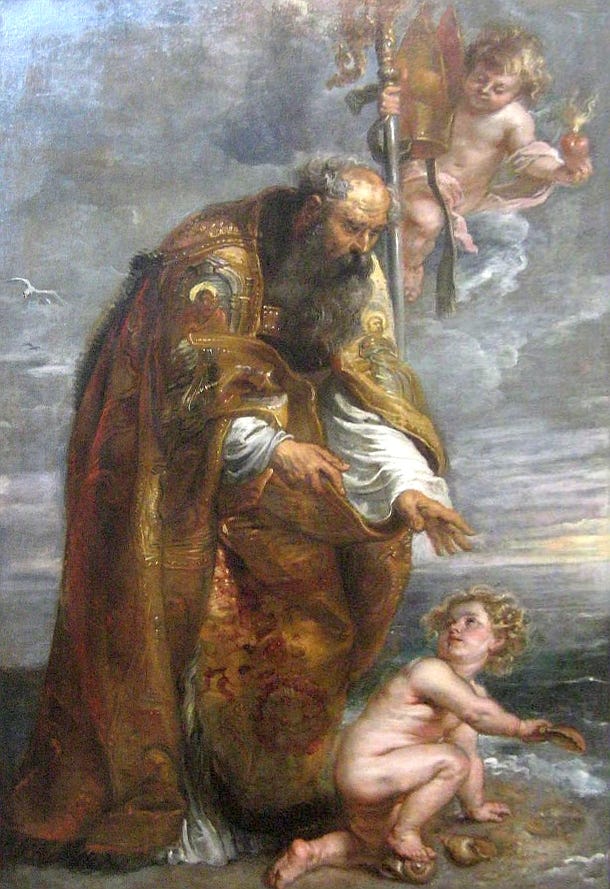Lessons from Saint Augustine
Finding the Path to Silence
A part of me is beginning to wonder if what I write and say offers any true value beyond the challenges and joy of writing professionally.
The older I get, the less I feel I know. I suppose it’s humility growing into me later in the game, for I have not been the most humble human among us, and there have been consequences.
I look around the world today and wonder how to make sense of humanity's seeming insanity. I sometimes feel helpless about what I might do in my remaining time to make a difference in the world beyond what little I’ve done for myself and my family. I play mindfulness games to keep my mind from diving into deep, dark rabbit holes.
But I can’t be the only creative person who wonders if it’s time to it's up the banter, be more still, and live the rest of my days in relative peace and silence. It’s not that I don’t love reading, writing, and consulting founders and CEOs for a living.
I do. But I can’t help but wonder if I’m doing any good. It’s as if there is a growing calling from deep within me saying, “Dude, enough of you already. It’s time to shift your focus to making a bigger difference in the world.”
But I’m unsure where or how which is one of my existential struggles. And so, here I sit, working it out with you.
When I learned about Saint Augustine and what led him to stop writing and take a vow of silence, I thought, “I’m no Saint, but I sure can relate.”
The best way to summarize Saint Augustine's later life is that he became so wise that he concluded he didn’t know much.
Augustine is one of the most revered humans in history. At the height of his career, he put pen to rest and took a vow of silence; this is his story.
St. Augustine by Rubens (1636-1638), Wikimedia Commons
Saint Augustine is one of the most influential figures in early Christianity. He is renowned for his deep insights and extensive writings, which have shaped Christian thought for centuries.
Augustine was born in 354 AD in what is now Algeria. A search marked his early life for meaning through various philosophies and a period of hedonistic living. This tumultuous youth eventually led him to Christianity, converting at the age of 31 under the influence of his devout mother, Monica, and Bishop Ambrose of Milan.
His conversion is detailed in his seminal work, "Confessions," where he famously wrote, “You have made us for yourself, O Lord, and our hearts are restless until they rest in you.”
As a bishop in Hippo (now Annaba, Algeria), Augustine faced numerous external challenges, including the collapse of the Roman Empire and threats from invading forces. Internal conflicts within the Church, such as heresies and theological disputes, compounded these pressures.
These tumultuous times tested Augustine's faith. He often sought solace in prayer and reflection, noting in his writings, “In my deepest wound, I saw your glory, and it dazzled me.”
Internally, Augustine grappled with profound doubts and questions about his faith. Despite his extensive writings, including influential works like "The City of God,” he felt that words could not always capture the depth of his spiritual experiences.
He once reflected, “God is best known in not knowing him,” highlighting the limits of human understanding in the face of divine mystery.
Around 426 AD, Augustine withdrew from public life, ceasing his writing and taking a vow of silence. A desire for deeper spiritual clarity and connection with God drove his decision.
Silence became his way of listening more intently to the divine and seeking answers to his most pressing spiritual questions. He believed “Silence is a source of great strength” and embraced it as a path to inner peace and enlightenment. During this period of silence, Augustine dedicated himself to prayer and contemplation.
His silence was a powerful testament to the idea that true understanding often requires listening rather than speaking.
This phase of his life underscored his unwavering commitment to his faith and his quest for spiritual growth. Saint Augustine's vow of silence was a significant chapter in his life, reflecting his deep spiritual commitment and introspective nature.
Even though he stopped writing, his legacy continued to inspire and guide others through his earlier works. His life and teachings remain a beacon for those seeking their own spiritual path.
Saint Augustine left us on August 28, 430 AD. He withdrew from public life only a few years earlier and spent the rest of his days in relative silence.
His example and legacy will live forever.
Clifford Jones is the founder and managing partner of Clarity Strategic Coaching, LLC. He serves conscious, coachable company founders and leaders as a strategic coach, revenue builder, and creative consultant. He is also a family man, writer, visual artist, and mental health advocate. Learn more at www.CliffordJones.com.



